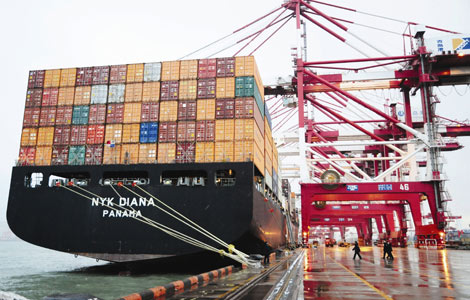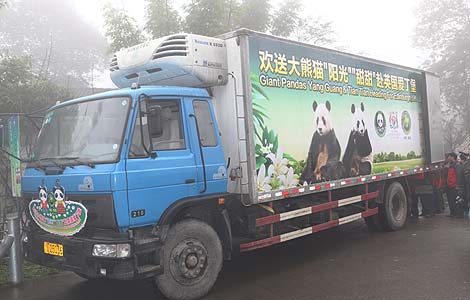Global business shares fruits of WTO accession
Updated: 2011-12-12 07:58
(China Daily)
|
|||||||||
|
 NYK Diana, a container ship, anchors at Qingdao Port in East China's Shandong province on Thursday, as workers load cargo. [Yu Fangping / for China Daily] |

BEIJING - For many multinational firms, the past 10 years in China have not only marked the rise of the world's second-largest economy but have also been a decade of expansion and profit growth.
As they look back at this "golden decade", which is often used to describe the days after China entered the World Trade Organization (WTO) in 2001, their early expectations and ambitions in a more liberalized Chinese market were found to be more than fulfilled.
When German auto giant BMW set foot on the Chinese mainland by establishing its first office in Beijing in 1994, its products were still far too luxurious for ordinary Chinese.
In 2001, only 6,500 vehicles were sold under the BMW and Mini brands in China.
But sales started to pick up with China's WTO entry, when the removal of trade barriers brought unprecedented economic growth and a booming market.
In 2010, the vehicle maker, which started a joint venture with the domestic Brilliance China Automotive in 2003, sold 169,000 vehicles in China.
That record is set to be broken this year as more than 170,000 cars were sold only in the first three quarters.
"We are both beneficiaries and firm supporters of the open market system," said Christoph Stark, president and CEO of BMW's Greater China region.
By liberalizing its market, China, which celebrated the 10th anniversary of its WTO accession on Sunday, has become a thriving market and a savior for foreign enterprises hit hard by the global downturn.
In 2009, when General Motors declared bankruptcy in the United States amid the global recession, its Chinese branch saw sales rise 66.9 percent year-on-year to more than 1.8 million units.
In 2010, China overtook the United States to become GM's largest national market.
The list of similar companies is extensive, as China's decade-long membership of the WTO has helped the Asian powerhouse attract 347,000 foreign firms with investment of more than $700 billion in the past 10 years.
Chong Quan, deputy representative for China's international trade talks, said foreign enterprises made more than $260 billion in profit in the 10-year period, with an average annual increase of 30 percent.
"The accession to the WTO has made China a more transparent, safe and predictable market, as well as an essential part of the global economy," said Dominique Poulique, president of Alstom China.
The French power engineering and train company, with more than 30 entities and about 10,000 employees in China, is one of the major foreign suppliers to the Chinese rail transport market.
"Rapid changes took place in China in the past decade, with its massive investment in infrastructure construction and notable development in energy," Poulique said.
Wang Zhile, director of the research center of transnational cooperation under the Ministry of Commerce, said increasing shared interests between China and multinationals are putting them into an inseparable community, one that has found win-win solutions in the past decade.
There is also high-quality labor at a relatively low cost, including white-collar workers, he added.
Admittedly, the huge market and rich resources have powered up multinational firms in global competition, especially during and after the financial crisis.
Forty-nine percent of the responding multinational companies had higher expectations for China in the wake of the global financial crisis in 2008 and 2009, according to a recent survey by the Economist Intelligence Unit, a business information arm of the Economist Group.
Although showing signs of a slowdown, China's economy is still widely expected to grow by more than 8 percent next year, at a time when debt and financial instability are weakening growth in other leading economies.
Poulique said he expected China's rapid growth to continue into the next decade, especially in the infrastructure construction market.
"For Alstom, the top task here is to keep adapting to the changing business environment," he said.
Many foreign companies are moving research and development facilities to China in the hopes of making it a base for talent and technology.
In Shanghai, 347 multinationals have set up regional headquarters, with the establishment of 333 foreign-funded research and development centers.
Xinhua











